Fleurs du Mal Magazine


Hij ging gebukt onder schulden, stond levenslang onder curatele, zag vele schrijfplannen stranden en kende geen geluk in de liefde.
 De verschijning van Les fleurs du mal leverde hem gerechtsvervolging en censuur op. En hij werd geteisterd door syfilis.
De verschijning van Les fleurs du mal leverde hem gerechtsvervolging en censuur op. En hij werd geteisterd door syfilis.
Uit zijn meer dan 1500 overgeleverde brieven komt Charles Baudelaire naar voren als een mens vol ambities en plannen, en met een druk sociaal leven en contacten met tal van schrijvers (Flaubert, Gautier, Hugo en Sainte -Beuve) en kunstenaars (Manet, Wagner en Nadar).
De boeiende correspondentie met zijn moeder toont hun complexe verstandhouding, die met zijn stiefvader laat zien dat ze lange tijd een warmere band hadden dan doorgaans gedacht wordt.
Charles Baudelaire (1821-1867) leidde een veelbewogen en tragisch leven. Het weerhield hem er niet van met Les fleurs du mal, waarmee hij de grote stad de dichtkunst in schreef, een van de meesterwerken van de Europese literatuur te schrijven.
Auteur: Charles Baudelaire
Mijn hoofd is een zieke vulkaan. Brieven
Vertaler: Kiki Coumans
Uitgeverij: De Arbeiderspers
NUR: 321
Paperback
ISBN: 9789029543774
Publicatiedatum: 30-03-2021
Prijs: € 27,50
• fleursdumal.nl magazine
More in: *Archive Les Poètes Maudits, - Book News, - Book Stories, Archive A-B, Archive A-B, Baudelaire, Charles
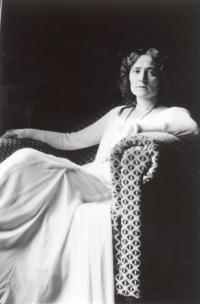
ARMOE
‘k Heb zoo’n honger naar een lied
In dit huis van eenzaam wezen,
Waar ‘k nog in geen blik mocht lezen
Dat een mensch me geren ziet.
‘t Kloksken tikt melankoliek…,
‘t maakt me monotoon en kranke,
God, ik smacht naar dieper klanken,
‘k Heb zoo’n honger naar muziek…
Ach…, En zoo ‘k mezelve sus
Met een blom of een gebêken…
Ziet ge niet mijn lippen smeeken…
‘k Heb zoo’n honger naar een kus!
Leven, dat ik lieven moet,
Leven… kunt ge zoo me laten
Zonder liefde… zonder haten…?
‘k Heb zoo’n honger naar uw gloed.
Alice Nahon
(1896-1933)
Armoe
• fleursdumal.nl magazine
More in: Archive M-N, Archive M-N, Nahon, Alice
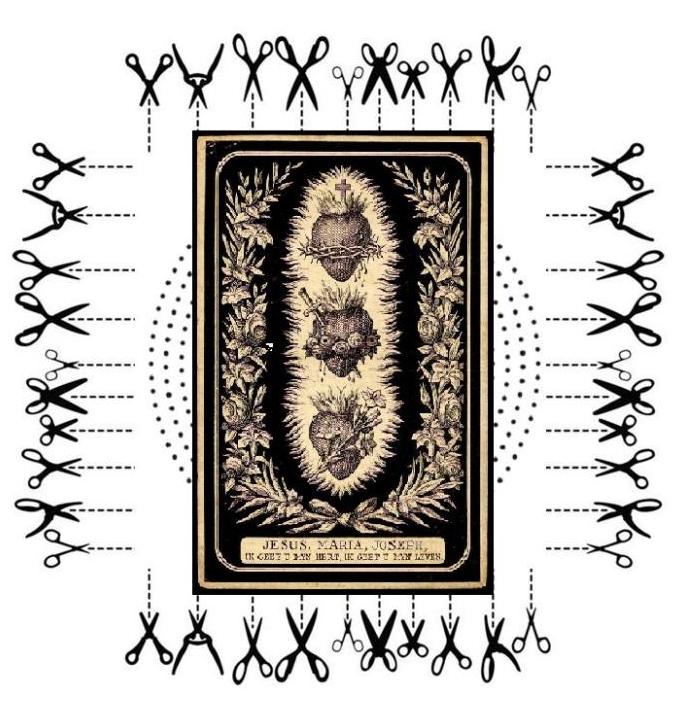
Sérgio Monteiro de Almeida
Poema visual: Scissors
Sérgio Monteiro de Almeida, Curitiba, Brazil (1964).
Intermedia visual poet and conceptual artist
Sérgio Monteiro de Almeida cv:
Curitiba, Brazil (1964). Intermedia visual poet and conceptual artist. – He has published in numerous anthologies and specialized magazines in Brazil and outside; participated in exhibitions of visual poetry as International Biennial of Visual and Alternative Poetry in Mexico (editions from 1987 to 2010); Post-Art International Exhibition of Visual / Experimental Poetry, San Diego State University-USA (1988); 51 and 53 Venice Biennial (2005 and 2009). – He published in 2007 the book Sérgio Monteiro de Almeida with a global vision about his work as a visual artist and poet. – This book was incorporated into the “Artist Books” collection of the New York City Library (USA). – Author of the CD of kinetic visual poems (EU) NI/IN VERSO (still unpublished). – He presented urban interventions in Curitiba, San Diego, Seattle, New York, Paris, Rome. – In 2014 and 2015 visual poems published in the Rampike experimental literature magazine of the University of Windsor, Canada. – He recently had his poems published in Jornal Candido (n. 64) and Relevo (2015 and 2016), and in 2017 in: fleursdumal.nl magazine for art & literature (www.fleursdumal.nl).
More about his work:
Livro eletrônico http://issuu.com/boek861/docs/sergio_monteiro_libro;
Enciclopédia Itaú Cultural de artes visuais www.itaucultural.com.br;
Videos no Youtube: http://www.youtube.com/user/SergioMAlmeida
Sérgio Monteiro de Almeida
Curitiba – PR – Brazil
email: sergio.ma@ufpr.br
• fleursdumal.nl magazine
More in: #Archive Concrete & Visual Poetry, *Concrete + Visual Poetry P-T, Archive M-N, EXPERIMENTAL POETRY, Sérgio Monteiro de Almeida
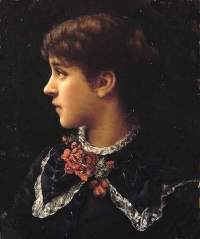
J’aurai vingt ans demain . . .
J’aurai vingt ans demain! Faut-il pleurer ou rire?
Saluer l’avenir, regretter le passé,
Et tourner le feuillet du livre qu’il faut lire,
Qu’il intéresse ou non, qu’on aime ou soit lassé?
Vingt ans, ce sont les fleurs toutes fraîches écloses,
Les lilas parfumés dans les feuillages verts,
Les marguerites d’or et les boutons de roses
Que le printemps qui fuit laisse tout entr’ouverts….
Mais c’est aussi parfois l’instant plein de tristesses
Où l’homme, regrettant les jours évanouis,
Au seuil de l’inconnu tout rempli de promesses
Sent des larmes au fond de ses yeux éblouis!
Pareil au jeune oiseau qui doute de son aile
Et n’ose s’élancer hors du nid suspendu,
Il hésite devant cette route nouvelle
Qui s’ouvre devant lui pleine d’inattendu.
L’oeil a beau ne rien voir de triste sur la route;
Malgré le gai soleil, les oiseaux et les fleurs,
Le coeur parfois frissonne et dans le calme écoute
Une lointaine voix qui parle de malheur.
Alice De Chambrier
(1861-1882)
J’aurai vingt ans demain. . .
• fleursdumal.nl magazine
More in: Alice De Chambrier, Archive C-D, Archive C-D, Chambrier, Alice De
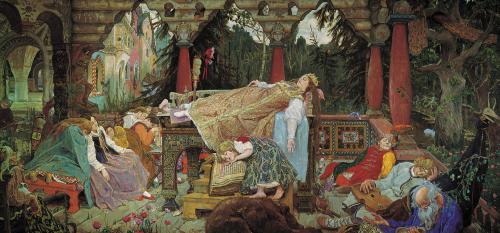
The Sleeping Princess
The ringing bells and the booming cannon
Proclaimed on a summer morn
That in the good king’s royal palace
A Princess had been born.
The towers flung out their brightest banners,
The ships their streamers gay,
And every one, from lord to peasant,
Made joyful holiday.
Great plans for feasting and merry-making
Were made by the happy king;
And, to bring good fortune, seven fairies
Were bid to the christening.
And for them the king had seven dishes
Made out of the best red gold,
Set thickly round on the sides and covers
With jewels of price untold.
When the day of the christening came, the bugles
Blew forth their shrillest notes;
Drums throbbed, and endless lines of soldiers
Filed past in scarlet coats.
And the fairies were there the king had bidden,
Bearing their gifts of good–
But right in the midst a strange old woman
Surly and scowling stood.
They knew her to be the old, old fairy,
All nose and eyes and ears,
Who had not peeped, till now, from her dungeon
For more than fifty years.
Angry she was to have been forgotten
Where others were guests, and to find
That neither a seat nor a dish at the banquet
To her had been assigned.
Now came the hour for the gift-bestowing;
And the fairy first in place
Touched with her wand the child and gave her
“Beauty of form and face!”
Fairy the second bade, “Be witty!”
The third said, “Never fail!”
The fourth, “Dance well!” and the fifth, “O Princess,
Sing like the nightingale!”
The sixth gave, “Joy in the heart forever!”
But before the seventh could speak,
The crooked, black old Dame came forward,
And, tapping the baby’s cheek,
“You shall prick your finger upon a spindle,
And die of it!” she cried.
All trembling were the lords and ladies,
And the king and queen beside.
But the seventh fairy interrupted,
“Do not tremble nor weep!
That cruel curse I can change and soften,
And instead of death give sleep!
“But the sleep, though I do my best and kindest,
Must last for an hundred years!”
On the king’s stern face was a dreadful pallor,
In the eyes of the queen were tears.
“Yet after the hundred years are vanished,”–
The fairy added beside,–
“A Prince of a noble line shall find her,
And take her for his bride.”
But the king, with a hope to change the future,
Proclaimed this law to be:
That, if in all the land there was kept one spindle,
Sure death was the penalty.
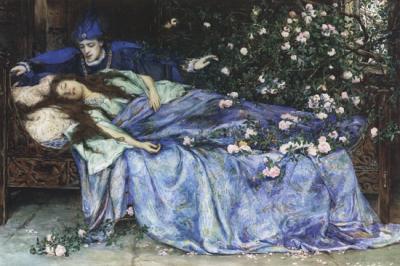
The Princess grew, from her very cradle
Lovely and witty and good;
And at last, in the course of years, had blossomed
Into full sweet maidenhood.
And one day, in her father’s summer palace,
As blithe as the very air,
She climbed to the top of the highest turret,
Over an old worn stair
And there in the dusky cobwebbed garret,
Where dimly the daylight shone,
A little, doleful, hunch-backed woman
Sat spinning all alone.
“O Goody,” she cried, “what are you doing?”
“Why, spinning, you little dunce!”
The Princess laughed: “‘Tis so very funny,
Pray let me try it once!”
With a careless touch, from the hand of Goody
She caught the half-spun thread,
And the fatal spindle pricked her finger!
Down fell she as if dead!
And Goody shrieking, the frightened courtiers
Climbed up the old worn stair
Only to find, in heavy slumber,
The Princess lying there.
They bore her down to a lofty chamber,
They robed her in her best,
And on a couch of gold and purple
They laid her for her rest,
The roses upon her cheek still blooming,
And the red still on her lips,
While the lids of her eyes, like night-shut lilies,
Were closed in white eclipse.
Then the fairy who strove her fate to alter
From the dismal doom of death,
Now that the vital hour impended,
Came hurrying in a breath.
And then about the slumbering palace
The fairy made up-spring
A wood so heavy and dense that never
Could enter a living thing.
And there for a century the Princess
Lay in a trance so deep
That neither the roar of winds nor thunder
Could rouse her from her sleep.
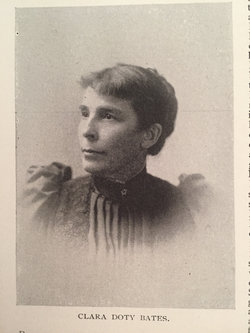
Then at last one day, past the long-enchanted
Old wood, rode a new king’s son,
Who, catching a glimpse of a royal turret
Above the forest dun
Felt in his heart a strange wish for exploring
The thorny and briery place,
And, lo, a path through the deepest thicket
Opened before his face!
On, on he went, till he spied a terrace,
And further a sleeping guard,
And rows of soldiers upon their carbines
Leaning, and snoring hard.
Up the broad steps! The doors swung backward!
The wide halls heard no tread!
But a lofty chamber, opening, showed him
A gold and purple bed.
And there in her beauty, warm and glowing,
The enchanted Princess lay!
While only a word from his lips was needed
To drive her sleep away.
He spoke the word, and the spell was scattered,
The enchantment broken through!
The lady woke. “Dear Prince,” she murmured,
“How long I have waited for you!”
Then at once the whole great slumbering palace
Was wakened and all astir;
Yet the Prince, in joy at the Sleeping Beauty,
Could only look at her.
She was the bride who for years an hundred
Had waited for him to come,
And now that the hour was here to claim her,
Should eyes or tongue be dumb?
The Princess blushed at his royal wooing,
Bowed “yes” with her lovely head,
And the chaplain, yawning, but very lively,
Came in and they were wed!
But about the dress of the happy Princess,
I have my woman’s fears–
It must have grown somewhat old-fashioned
In the course of so many years!
Clara Doty Bates
(1838 – 1895)
The Sleeping Princess
Versified by Mrs. Clara Doty Bates
fleursdumal.nl magazine
More in: Archive A-B, Archive A-B, Bates, Clara Doty, Children's Poetry, Grimm, Andersen e.o.: Fables, Fairy Tales & Stories, Tales of Mystery & Imagination
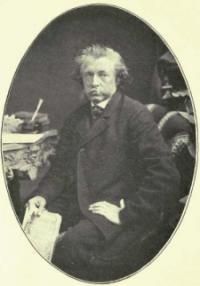
The Dreamer
Spirit of Song! whose whispers
Delight my pensive brain,
When will the perfect harmony
Ring through my feeble strain?
When will the rills of melody
Be widened to a stream!
When will the bright and gladsome Day
Succeed this morning dream?
“Mortal,” the spirit whispered,
“If thou wouldst truly win
The race thou art pursuing,
Heed well the voice within:
And it shall gently teach thee
To read thy heart, and know
No human strain is perfect,
However sweet it flow.
And if thou readest truly,
As surely shalt thou find
That truths, like rills, though diverse,
Are choicest in their kind.
The souls of Poet-Dreamers
Touch heaven on their way;
With the light of Song to guide them
It should be always Day.”
Charles Sangster
(1822 – 1893)
The Dreamer
• fleursdumal.nl magazine
More in: Archive S-T, Archive S-T, CLASSIC POETRY
Expositie Ricardo van Eyk
van 22.04 – 13.06 /2021
CIVIL wordt een ruimtevullende totaalinstallatie van Ricardo van Eyk bestaande uit nieuw werk, grotendeels geproduceerd tijdens een werkperiode van bijna 4 weken in PARK; de tentoonstelling wordt hoofdzakelijk ter plekke ontwikkeld.
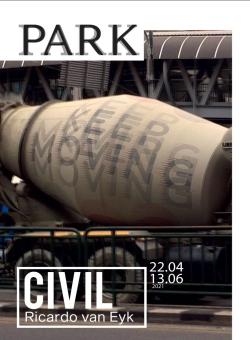 ‘Hoewel mijn werk zich vooral binnen de schilderkunst begeeft, laten de fascinaties waaruit ik werk zich niet uitsluitend uitdrukken in het tweedimensionale. (…) In al mijn presentaties ben ik op zoek naar de dialoog tussen het werk en de ruimte; het beïnvloedt de keuze en plaatsing van voltooide werken; of verdergaande ruimtelijke ingrepen met wanden of vloerdelen worden vooraf ontworpen. Door langer ter plekke te kunnen werken, wil ik de ruimte toestaan een veel directere invloed op het proces te hebben, en daarmee de reguliere functie van de ruimte als achtergrond voor het ‘werk’ te verstoren.’
‘Hoewel mijn werk zich vooral binnen de schilderkunst begeeft, laten de fascinaties waaruit ik werk zich niet uitsluitend uitdrukken in het tweedimensionale. (…) In al mijn presentaties ben ik op zoek naar de dialoog tussen het werk en de ruimte; het beïnvloedt de keuze en plaatsing van voltooide werken; of verdergaande ruimtelijke ingrepen met wanden of vloerdelen worden vooraf ontworpen. Door langer ter plekke te kunnen werken, wil ik de ruimte toestaan een veel directere invloed op het proces te hebben, en daarmee de reguliere functie van de ruimte als achtergrond voor het ‘werk’ te verstoren.’
Het statige Tilburgse Wilhelminapark en omringende gebouwen, maar ook museum De Pont en het TextielMuseum vlakbij, zijn een herinnering aan de succesvolle textielindustrie in de 19e en begin 20e eeuw. De titel CIVIL benadrukt van deze omgeving twee interessante gegevens: enerzijds de civiele techniek, grote bouwprojecten in de vorm van de twee voormalige textielfabrieken; anderzijds burgerschap en hoe dit deel van de stad zich hier op inricht, bijvoorbeeld infrastructuur of parken zoals het Wilhelminapark.’
expositie Ricardo van Eyk
22.04 – 13.06 / 2021
Info/tijdslot reserveren enz. via website: PARK platform for visual arts
PARK
Wilhelminapark 53,
5041 ED Tilburg
park(at)park013.nl
Twitter.com/ParkTilburg
Facebook.com/Park013
https://www.instagram.com/park_tilburg/
PARK ligt op 10 minuten loopafstand van het Centraal Station Tilburg in de nabijheid van Museum De Pont. Er is beperkt parkeergelegenheid voor de deur.
PARK is een kunstinitiatief opgericht in 2013 door Rob Moonen in samenwerking met een zestal andere Tilburgse kunstenaars. Op dit moment bestaat de PARK werkgroep uit Linda Arts, René Korten, Rob Moonen en Liza Voetman.
PARK ziet de noodzaak van een middenpodium dat zich positioneert tussen Kunstpodium T en Museum De Pont en zet zich daarvoor in door een tentoonstellingsprogramma in de voormalige Goretti-kapel aan het Wilhelminapark te Tilburg te realiseren.
PARK richt zich op actuele ontwikkelingen binnen de hedendaagse kunst én op kunstenaars met gedegen ervaring en bewezen kwaliteit. Er wordt plek geboden aan regionale collega’s maar ook aan landelijk of internationaal opererende kunstenaars, juist om een positieve bijdrage aan de discussie over actuele kunst tot stand te brengen. De werkgroep ambieert het podium van belang te laten zijn op landelijk niveau, maar bij elk project wordt met nadruk gezocht naar een inhoudelijke koppeling met de stad. De werkgroep is er van overtuigd dat samenwerking met andere partijen de zichtbaarheid en functionaliteit van de plek zal versterken, maar ook dat de plek een waardevolle stimulans voor de beeldende kunst in de stad en de regio zal kunnen zijn.
PARK wil een bijdrage leveren aan de ontwikkeling van een gunstig productie- en vestigingsklimaat voor beeldend kunstenaars uit de regio door deze in contact te brengen met een nationaal en internationaal netwerk.
Per jaar worden er vier a vijf projecten en een zomerresidentie gerealiseerd met waar mogelijk een bijpassend raamprogramma in de vorm van lezingen, kunstenaarsgesprekken, muziek en film.
fleursdumal.nl magazine
More in: Art & Literature News, Art Criticism, Exhibition Archive, Linda Arts, Park
This is a meditation on the power of creative connection. Drawing on twenty years’ experience as a writer and performer, Kae Tempest explores how and why creativity – however we choose to practise it – can cultivate greater self-awareness and help us establish a deeper relationship between ourselves and the world. Honest, tender and written with piercing clarity, On Connection is a call to arms that speaks to a universal yet intimate truth.
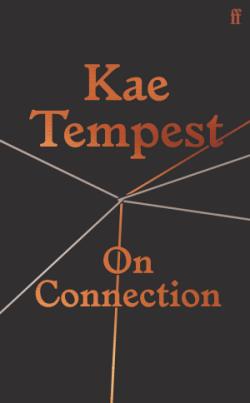 On Connection will be the first work published under their new name and pronouns. Kate to Kae. She/Her to They/Them. Pronounced like the letter ‘K’. For more information visit kaetempest.co.uk.
On Connection will be the first work published under their new name and pronouns. Kate to Kae. She/Her to They/Them. Pronounced like the letter ‘K’. For more information visit kaetempest.co.uk.
Kae Tempest is an award-winning, Sunday Times-bestselling author, poet and recording artist. Tempest won the 2013 Ted Hughes Award, was nominated for a Costa Book Award and a BRIT Award, has been shortlisted for the Mercury Prize twice and was nominated for two Ivor Novello Awards. They were also named a Next Generation Poet by the Poetry Book Society, a decennial accolade. They released their fourth studio album, The Book of Traps and Lessons, in 2019, produced by Rick Rubin. Tempest grew up in South-East London, where they still live. @kaetempest
Letter from Kae/Kate Tempest to the readers:
I’ve been struggling to accept myself as I am for a long time. I have tried to be what I thought others wanted me to be so as not to risk rejection. This hiding from myself has led to all kinds of difficulties in my life. And this is a first step towards knowing and respecting myself better. I’ve loved Kate. But I am beginning a process and I hope you’ll come with me … [Kae is] an old English word that means jay bird. Jays are associated with communication, curiosity, adaptation to new situations and COURAGE which is the name of the game at the moment. It can also mean jackdaw which is the bird that symbolises death and rebirth. Ovid said the jackdaw brought the rain. Which I love. It has its roots in the Latin word for rejoice, be glad and take pleasure. And I hope to live more that way each day … This is a time of great reckoning. Privately, locally, globally. For me, the question is no longer ‘when will this change’ but ‘how far am I willing to go to meet the changes and bring them about in myself.’ I want to live with integrity. And this is a step towards that. Sending LOVE always.
Instagram 06-08-2020
On Connection
by Kae Tempest (Author)
Hardcover
144 pages
ISBN-10 : 0571354025
ISBN-13 : 978-0571354023
Product Dimensions : 11.1 x 1 x 17.8 cm
Publisher : Faber & Faber
Language: : English
Main Edition (2020)
Price £9.99
• fleursdumal.nl magazine
More in: #Archive A-Z Sound Poetry, Archive S-T, Archive S-T, Art & Literature News, Kate/Kae Tempest, Tempest, Kate/Kae
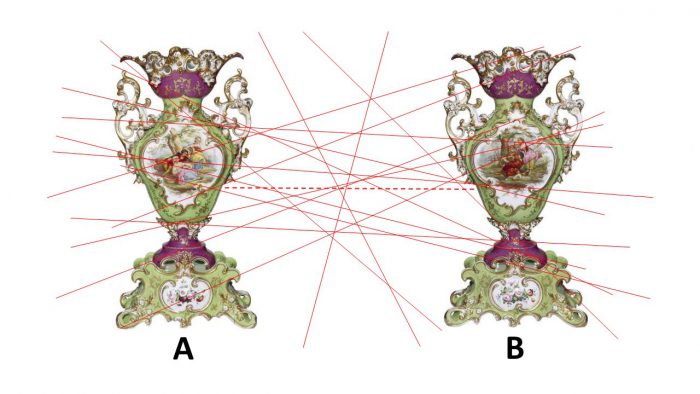
Sérgio Monteiro de Almeida
Poema visual: Pair of vases #2
Sérgio Monteiro de Almeida, Curitiba, Brazil (1964).
Intermedia visual poet and conceptual artist
Sérgio Monteiro de Almeida cv:
Curitiba, Brazil (1964). Intermedia visual poet and conceptual artist. – He has published in numerous anthologies and specialized magazines in Brazil and outside; participated in exhibitions of visual poetry as International Biennial of Visual and Alternative Poetry in Mexico (editions from 1987 to 2010); Post-Art International Exhibition of Visual / Experimental Poetry, San Diego State University-USA (1988); 51 and 53 Venice Biennial (2005 and 2009). – He published in 2007 the book Sérgio Monteiro de Almeida with a global vision about his work as a visual artist and poet. – This book was incorporated into the “Artist Books” collection of the New York City Library (USA). – Author of the CD of kinetic visual poems (EU) NI/IN VERSO (still unpublished). – He presented urban interventions in Curitiba, San Diego, Seattle, New York, Paris, Rome. – In 2014 and 2015 visual poems published in the Rampike experimental literature magazine of the University of Windsor, Canada. – He recently had his poems published in Jornal Candido (n. 64) and Relevo (2015 and 2016), and in 2017 in: fleursdumal.nl magazine for art & literature (www.fleursdumal.nl).
More about his work:
Livro eletrônico http://issuu.com/boek861/docs/sergio_monteiro_libro;
Enciclopédia Itaú Cultural de artes visuais www.itaucultural.com.br;
Videos no Youtube: http://www.youtube.com/user/SergioMAlmeida
Sérgio Monteiro de Almeida
Curitiba – PR – Brazil
email: sergio.ma@ufpr.br
• fleursdumal.nl magazine
More in: #Archive Concrete & Visual Poetry, *Concrete + Visual Poetry P-T, Archive M-N, EXPERIMENTAL POETRY, Sérgio Monteiro de Almeida
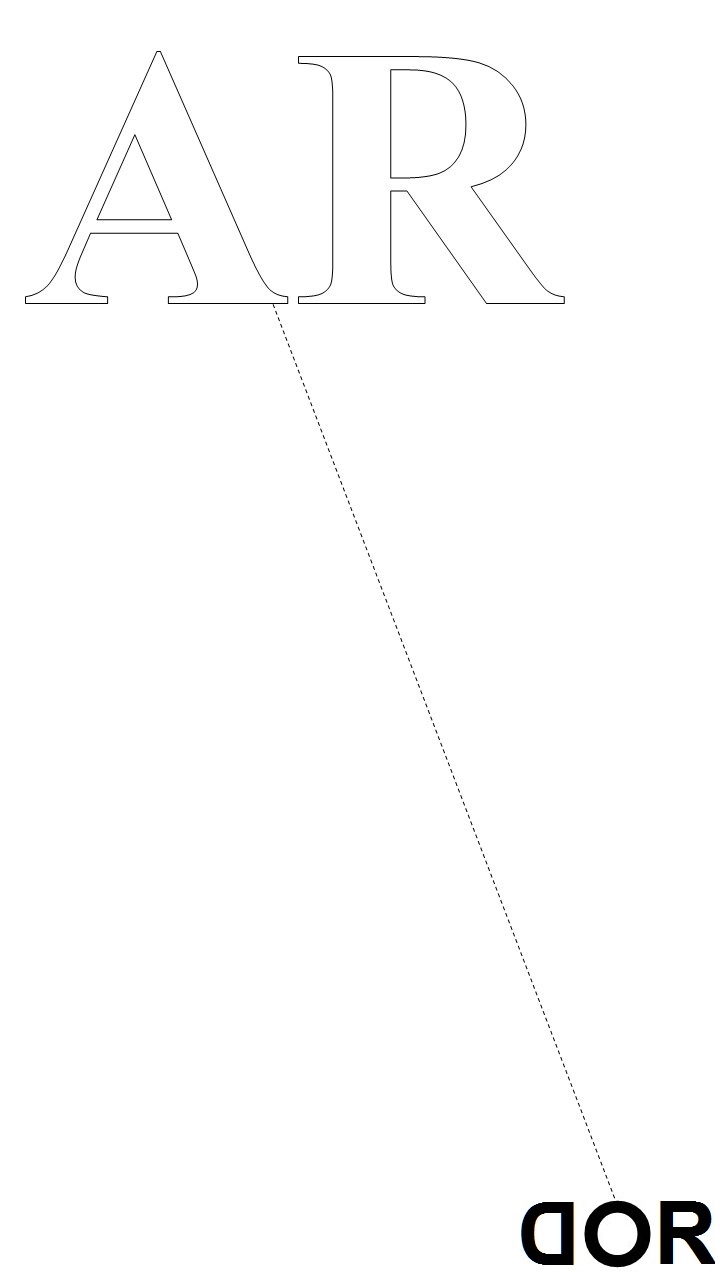
Sérgio Monteiro de Almeida
Poema visual: AR_dor (Air_ ache= ardor), for me this is the summary of these pandemic times
Sérgio Monteiro de Almeida, Curitiba, Brazil (1964).
Intermedia visual poet and conceptual artist
Sérgio Monteiro de Almeida cv:
Curitiba, Brazil (1964). Intermedia visual poet and conceptual artist. – He has published in numerous anthologies and specialized magazines in Brazil and outside; participated in exhibitions of visual poetry as International Biennial of Visual and Alternative Poetry in Mexico (editions from 1987 to 2010); Post-Art International Exhibition of Visual / Experimental Poetry, San Diego State University-USA (1988); 51 and 53 Venice Biennial (2005 and 2009). – He published in 2007 the book Sérgio Monteiro de Almeida with a global vision about his work as a visual artist and poet. – This book was incorporated into the “Artist Books” collection of the New York City Library (USA). – Author of the CD of kinetic visual poems (EU) NI/IN VERSO (still unpublished). – He presented urban interventions in Curitiba, San Diego, Seattle, New York, Paris, Rome. – In 2014 and 2015 visual poems published in the Rampike experimental literature magazine of the University of Windsor, Canada. – He recently had his poems published in Jornal Candido (n. 64) and Relevo (2015 and 2016), and in 2017 in: fleursdumal.nl magazine for art & literature (www.fleursdumal.nl).
More about his work:
Livro eletrônico http://issuu.com/boek861/docs/sergio_monteiro_libro;
Enciclopédia Itaú Cultural de artes visuais www.itaucultural.com.br;
Videos no Youtube: http://www.youtube.com/user/SergioMAlmeida
Sérgio Monteiro de Almeida
Curitiba – PR – Brazil
email: sergio.ma@ufpr.br
• fleursdumal.nl magazine
More in: #Archive Concrete & Visual Poetry, *Concrete + Visual Poetry P-T, Archive M-N, EXPERIMENTAL POETRY, Sérgio Monteiro de Almeida

Sankt Peter und der Blaustrumpf
Ein Weiblein klopft an’s Himmelsthor,
Sankt Peter öffnet, guckt hervor:
– »Wer bist denn du?« – »Ein Strumpf, o Herr …«
Sie stockt, und milde mahnet er:
»Mein Kind, erkläre dich genauer,
Was für ein Strumpf?« »Vergieb – ein blauer.«
Er aber grollt: »Man trifft die Sorte
Nicht häufig hier an unsrer Pforte.
Seid samt und sonders freie Geister,
Der Teufel ist gar oft nicht dreister,
Geh hin! er dürfte von dir wissen,
Der liebe Herrgott kann dich missen.«
– »Das glaub ich wohl – doch ich nicht Ihn,
O Heilger, wolle noch verziehn!«
Sie wagt es, sein Gewand zu fassen,
Hat auf die Knie sich sinken lassen:
»Du starker Hort, verstoß mich nicht,
Laß blicken mich in’s Angesicht
Des Ewgen, den ich stets gesucht.«
– »In welcher Weise, ward gebucht;
Man strebt ihm nach, wie’s vorgeschrieben,
Du bist uns fern und fremd geblieben.«
Das Weib blickt flehend zu ihm auf:
»Wär dir bekannt mein Lebenslauf,
Du wüßtest, daß in selgen Stunden
Ich meinen Herrn und Gott gefunden.«
Der Pförtner stutzt: »Allwo? – Sprich klar!«
– »Daselbst, wo ich zu Hause war,
(Mein Handwerk brachte das mit sich)
Im Menschenherzen. Wunderlich
War dort der Höchste wohl umgeben;
Oft blieb von seines Lichtes Weben
Ein glimmend Fünklein übrig nur
Und führte doch auf Gottes Spur.
Ob er sich nun auf dem Altare
Den Frommen reicher offenbare –
Das zu entscheiden ist dein Amt:
Bin ich erlöst? bin ich verdammt?«
Sankt Peter zu derselben Frist
Etwas verlegen worden ist,
Dacht eine gute Weile nach,
Nahm endlich doch das Wort. Er sprach
Und rückt dabei den Heilgenschein:
»Besprich es drin – ich laß dich ein.«
Marie Ebner-Eschenbach
(1830 – 1916)
Sankt Peter und der Blaustrumpf
• fleursdumal.nl magazine
More in: Archive E-F, Archive E-F, CLASSIC POETRY
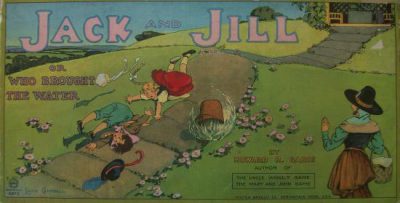
Jack And Jill
Little boys, sit still–
Girls, too, if you will–
And let me tell you of Jack and Jill;
For I think another
Such sister and brother
Were never the children of one mother!
For an idle lad,
As he was, Jack had
No traits, after all, that were very bad.
He, was simply Jack,
With the coat on his back
Patched up in all colors from gray to black.

Both feet were bare;
And I do declare
That he never washed his face; and his hair
Was the color of straw–
You never saw
Such a crop–as long as the moral law!
When he went to school,
It was the rule
(Though ’twas hard to say he was really a fool)
To send him at once,
So thick was his sconce,
To the block that was kept for the greatest dunce.
And Jill! no lass
Scarce ever has
Made bigger tracks on the country grass;
For her only fun
Was to romp and run,
Bare-headed, bare-footed, in wind and sun.
Wherever went Jack,
Close on his track,
With hair unbraided and down her back,
Loud-voiced and shrill,
She followed, until
No one said “Jack” without saying “Jill.”
But to succeed
In teaching to read
Such a harum-scarum, was work indeed!
And I’m forced to tell
That her way to spell
Her name was with only a single ‘l.’
Yet they were content.
One day they were sent
To the hill for water, and they went.
They did not drown,
But Jack fell down,
With a pail in his hand, and broke his crown!
And Jill, who must go
And always do
Exactly as Jack did, tumbled too!
Just think, if you will,
How they rolled down hill–
Straw-headed Jack and bare-footed Jill!
But up Jack got,
And home did trot,
Nor cared whether Jill was hurt or not;
While his poor bruised knob
Did burn and throb,
Tear falling on tear, sob following sob!
He could run the faster,
So a paper plaster
Had bound up the sight of his disaster
Before Jill came;
And the thoughtful dame,
For a break in her head, had fixed the same.
But Jill came in,
With a saucy grin
At seeing the plight poor Jack was in;
And when she saw
That bundle of straw
(His hair) bound up with a cloth, and his jaw
Tied up in white,
The comical sight
Made her clap her hands and laugh outright!
The dame, perplexed
And dreadfully vexed,
Got a stick and said, “I’ll whip her next!”
How many blows fell
I will not tell,
But she did it in earnest, she did it well,
Till the naughty back
Was blue and black,
And Jill needed a plaster as much as Jack!
The next time, though,
Jack has to go
To the hill for water, I almost know
That bothering Jill
Will go up the hill,
And if he falls again, why, of course she will!
Clara Doty Bates
(1838 – 1895)
Jack And Jill
Versified by Mrs. Clara Doty Bates
fleursdumal.nl magazine
More in: Archive A-B, Archive A-B, Bates, Clara Doty, Children's Poetry, Grimm, Andersen e.o.: Fables, Fairy Tales & Stories, Tales of Mystery & Imagination
Thank you for reading Fleurs du Mal - magazine for art & literature